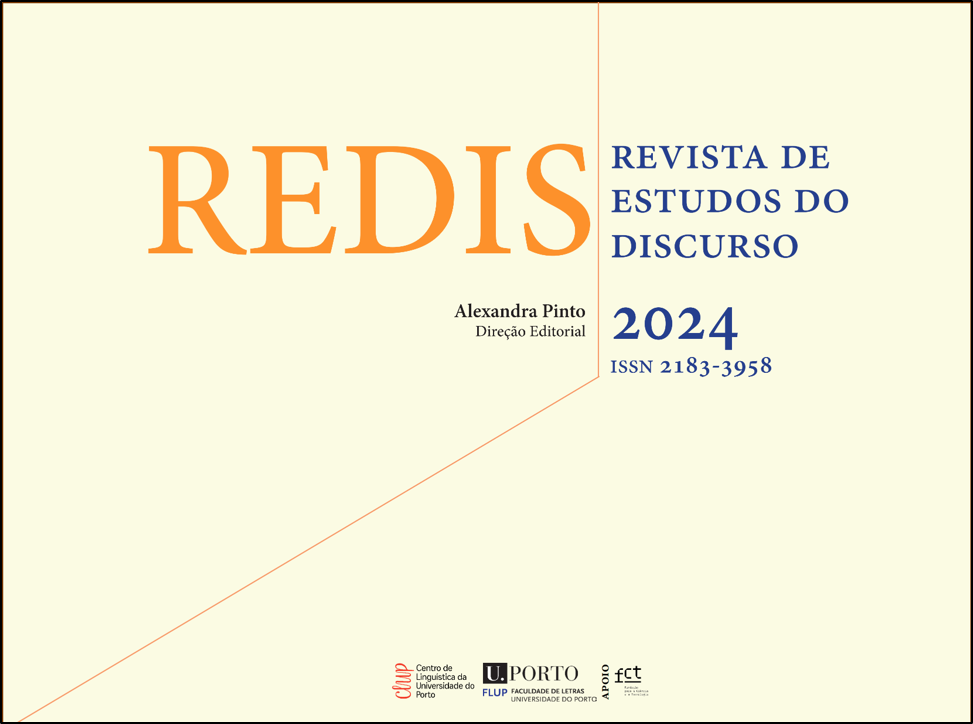The Hermeneutic Framework: A Category for Negotiating Meaning Effects in the Work Symetrias Dyssonantes by Luiz Brás
DOI:
https://doi.org/10.21747/21833958/red15a2Keywords:
Hermeneutic framework, Rhizome, Metafiction, Science fiction, InterdiscourseAbstract
This article explores the enunciative-discursive constitution of the hermeneutic framework in literary statements extracted from the short story collection Symetrias Dyssonantes by Luiz Brás, employing the theoretical and methodological framework of French Discourse Analysis. Based on Maingueneau (2006), the hermeneutic framework serves as a category that provides conditions for negotiating meaning effects in literary discourse, as it maps discursive formations without hierarchizing them. The research examines the hermeneutic framework through the discursive formations of Brazilian Science Fiction (BSF), Philosophy—particularly the concept of rhizome by Deleuze and Guattari (1995)—and Metafiction, as proposed by Hutcheon (1994). The study situates BSF within the 21st century, emphasizing its speculative nature in addressing scientific, cultural, and social issues relevant to contemporary science. Deleuze and Guattari’s (1995) notion of the rhizome sheds light on the literary work as a machinic assemblage characterized by multiplicity and continuous reconfiguration. Metafiction, on the other hand, facilitates reflection on the narrative's nature and the interaction between fiction and reality, highlighting BSF's ability to question and expand the boundaries of literature by engaging the co-enunciator in creating meanings from unfolded realities. Ultimately, the research underscores the importance of a critical co-enunciator in literary enunciation, one that explores the interpretive possibilities offered by interdiscourse.
References
BERNARDO, G. (2010). O livro da metaficção. Tinta Negra Bazar Editorial.
BRAS, L. (2012). Convite ao mainstream. In.: Jornal Rascunho. Disponível em: https://rascunho.com.br/colunistas/ruido-branco/convite-ao-mainstream/
BRAS, L. (2021). Symetrias Dyssonantes. Líquido Editorial.
CHARAUDEAU, P.; MAINGUENEAU, D. (2008). Dicionário de Análise do Discurso (Trad. Fabiana Komesu. 2 ed). Contexto.
DELEUZE, G. & GUATTARI, F. (1995). Mil Platôs: capitalismo e esquizofrenia (Trad. Aurélio Guerra Neto e Célia Pinto Costa. 1ª ed.). Editora 34.
HUTCHEON, L. (1984). Narcissistic Narrative: the metafictional paradox. Methuen.
LEMOS, C. S. (2018). Menina bonita bordada de entropia. In.: OLIVEIRA, N. Fractais Tropicais (pp. 70-79). SESI-SP.
MAINGUENEAU, D. (2006). Discurso literário. Contexto.
MATANGRANO, B; TAVARES, E (2018). Fantástico brasileiro: o insólito literário do romantismo ao fanatismo. Arte & Letra.
NAVAS, D. (2009). Narcisismo discursivo e metaficção: Antonio Lobo Antunes e a revolução do romance. Scortecci.
ROBERTS, A. (2018). A verdadeira história da ficção científica: do preconceito à conquista das massas (Trad. Mário Molina). Seoman.
Downloads
Published
How to Cite
Issue
Section
License
Copyright (c) 2024 Ricardo Celestino

This work is licensed under a Creative Commons Attribution 4.0 International License.
The authors give to REDIS. Revista de Estudos do Discurso the exclusive right to publish its texts, in any medium, including their reproduction and sale in paper or digital format, as well as their availability in a free access regime in databases.
















